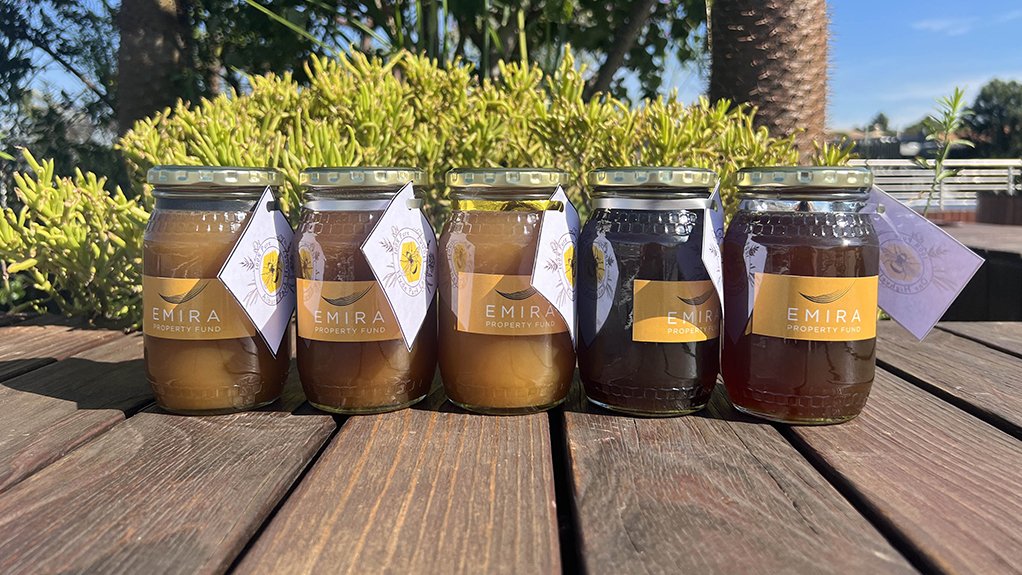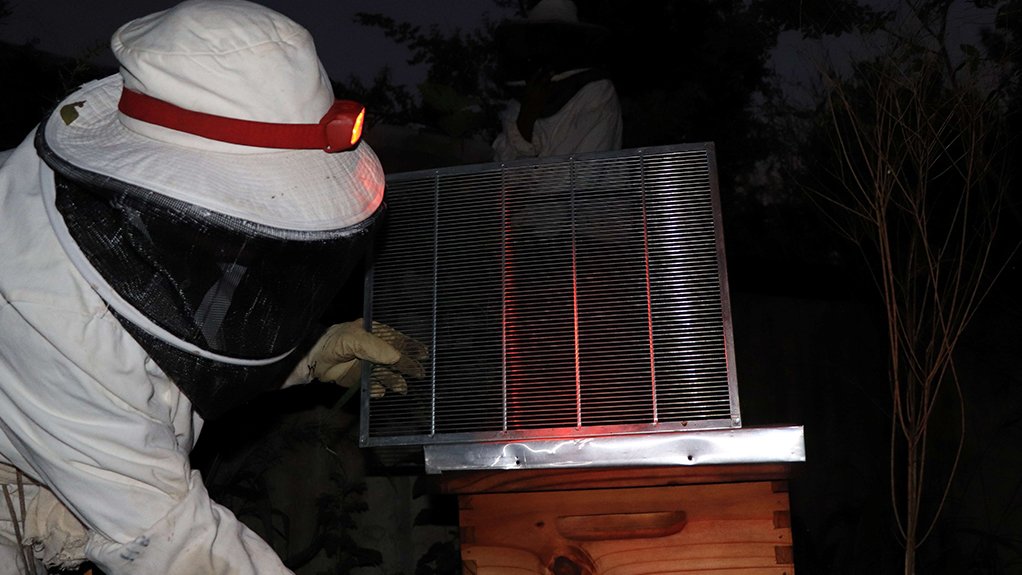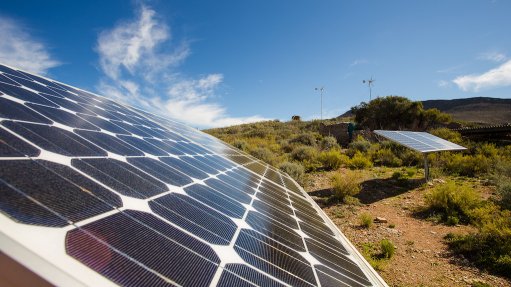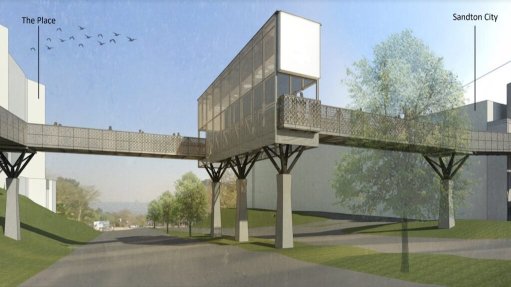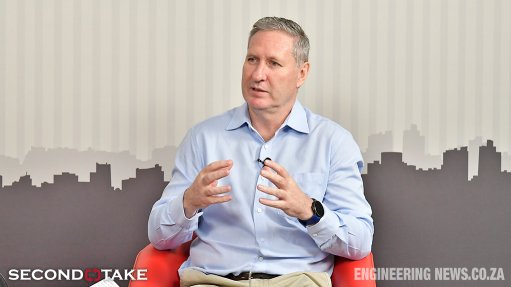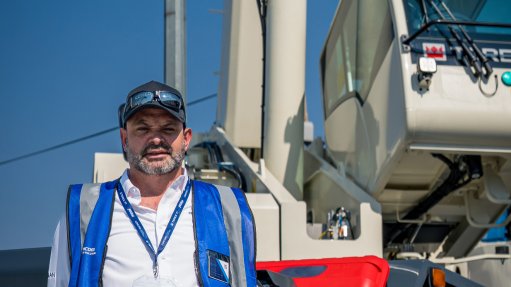Emira continues driving biodiversity preservation through beehives
JSE-listed Emira Property Fund acknowledges the importance of bees and has, as at July 5, installed 16 beehives at eight of its properties in Gauteng and KwaZulu-Natal.
Five of these sites have managed to produce 85 kg of honey, to date, in addition to countless biodiversity benefits.
COO Ulana van Biljon explains that the beehive project was chosen to address the global decline of bee populations, which contribute much to society, as bees are vital for pollinating plants, including food crops.
According to the United Nations Food and Agriculture Organisation, a third of global food production depends on bees as pollinators.
“Simply put, all life on the planet relies on these essential workers, but they are increasingly threatened by human activity, under grave threat from habitat loss, pesticides, air pollution and climate change.
“Our bee conservation project is a holistic approach to reducing the impact of environmental degradation, which goes beyond planting trees,” Van Biljon states.
Emira’s first hives were installed in August 2020 at the Knightsbridge office park in Bryanston, as well as Hyde Park Lane, in Sandton.
These sites were selected owing to their safe site location, the biodiversity of the surrounding landscape and the abundance of flowering plants which provide the nectar flow for the bees to produce honey.
Subsequently, beehives were introduced at Wonderpark Shopping Centre in Pretoria North; One Highveld industrial premises in Centurion, Pretoria; Springfield open-air retail centre in Umgeni, Durban; Park Boulevard local shopping centre in Durban North; Albury Park, a garden-life office environment in Dunkeld, Johannesburg; and Epsom Downs Office Park near William Nicol offramp, Sandton.
Van Biljon says Emira carefully considered the safety of both the bees and the public, with beehives being managed in a controlled environment, away from areas of heavy foot traffic and clearly sign-posted, while beekeeping activities take place at night.
The first honey harvests were shared amongst Emira staff and a few service providers, creating awareness of the importance of preserving biodiversity. It is their intention to make future honey available for their tenants at those properties that have the hives.
The honey collected from different properties all tasted unique. Bees tend to collect nectar within 3 km of their hive, which meant Johannesburg honey was crafted largely from exotic garden ornamental plants like jasmine, lavender, rosemary and jacaranda trees.
Meanwhile, Pretoria North – where hives are situated at Wonderpark Shopping Centre – has more indigenous plants, acacias and grassland flowers, meaning honey with darker, flavourful herbal tannins.
The honey is not for sale, although Emira is open to investigating charity initiatives as their buzzy new tenants continue to upscale production; instead, the profit is in biodiversity.
“Biodiversity is vital for healthy ecosystems, which support human well-being and the economy. Healthy ecosystems form the ecological infrastructure of the country, providing clean air and water, fertile soil, and food,” Van Biljon notes.
As part of Emira’s dedication to good environmental, social and governance practices, it has committed to a “No Net Future Loss” policy, conserving and promoting biodiversity across its portfolio and reducing the company’s impact on the environment.
“The country’s natural ecosystems are threatened by land use change, degradation and invasive alien species. Climate change worsens these threats, but healthy ecosystems offer natural solutions that increase resilience.
“They protect communities from extreme weather events and enhance natural resources, livelihoods, food security, and habitats for animals and plants,” Van Biljon concludes.
With the beehive project, Emira is living up to its reputation as a truly diversified, balanced real estate investment trust.
Comments
Press Office
Announcements
What's On
Subscribe to improve your user experience...
Option 1 (equivalent of R125 a month):
Receive a weekly copy of Creamer Media's Engineering News & Mining Weekly magazine
(print copy for those in South Africa and e-magazine for those outside of South Africa)
Receive daily email newsletters
Access to full search results
Access archive of magazine back copies
Access to Projects in Progress
Access to ONE Research Report of your choice in PDF format
Option 2 (equivalent of R375 a month):
All benefits from Option 1
PLUS
Access to Creamer Media's Research Channel Africa for ALL Research Reports, in PDF format, on various industrial and mining sectors
including Electricity; Water; Energy Transition; Hydrogen; Roads, Rail and Ports; Coal; Gold; Platinum; Battery Metals; etc.
Already a subscriber?
Forgotten your password?
Receive weekly copy of Creamer Media's Engineering News & Mining Weekly magazine (print copy for those in South Africa and e-magazine for those outside of South Africa)
➕
Recieve daily email newsletters
➕
Access to full search results
➕
Access archive of magazine back copies
➕
Access to Projects in Progress
➕
Access to ONE Research Report of your choice in PDF format
RESEARCH CHANNEL AFRICA
R4500 (equivalent of R375 a month)
SUBSCRIBEAll benefits from Option 1
➕
Access to Creamer Media's Research Channel Africa for ALL Research Reports on various industrial and mining sectors, in PDF format, including on:
Electricity
➕
Water
➕
Energy Transition
➕
Hydrogen
➕
Roads, Rail and Ports
➕
Coal
➕
Gold
➕
Platinum
➕
Battery Metals
➕
etc.
Receive all benefits from Option 1 or Option 2 delivered to numerous people at your company
➕
Multiple User names and Passwords for simultaneous log-ins
➕
Intranet integration access to all in your organisation



